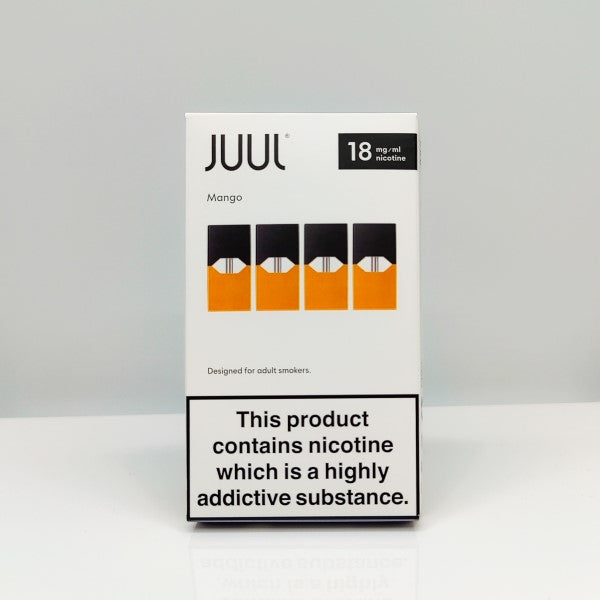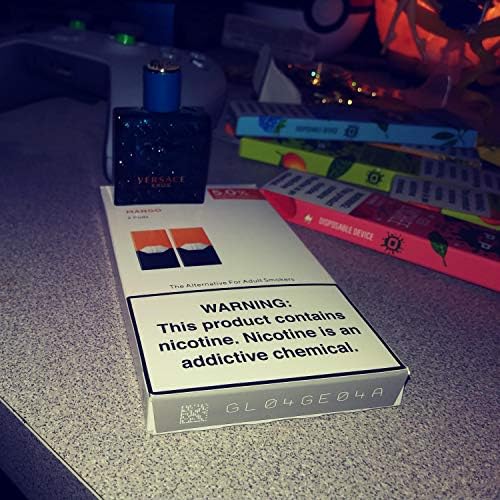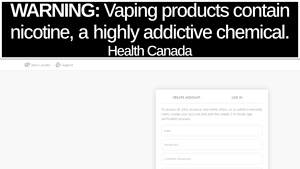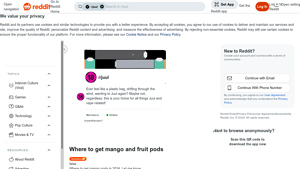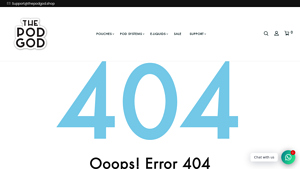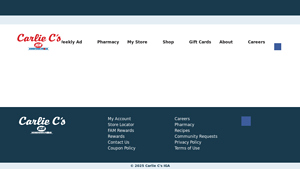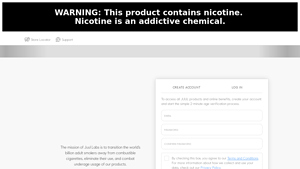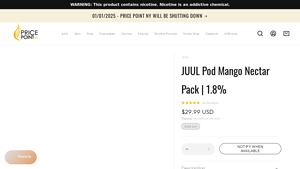Juul Pod Mango Guide: Type,Cost,Material…
Introduction: Navigating the Global Market for juul pod mango
The global market for JUUL pod mango presents a unique opportunity for B2B buyers seeking to meet the growing demand for vaping products that appeal to adult consumers. However, navigating this landscape can be challenging due to varying regulations, product quality, and sourcing complexities across regions. This guide is designed to equip international buyers, particularly those from Africa, South America, the Middle East, and Europe—including Nigeria and Germany—with the essential insights needed to make informed purchasing decisions.
Within this comprehensive resource, we will explore various aspects of JUUL pod mango, including the different types available, their applications in the market, and strategies for effectively vetting suppliers. Additionally, we will provide an overview of cost considerations and potential pricing structures to help you optimize your procurement process. By understanding the nuances of this market, you will be better positioned to identify reputable suppliers and secure high-quality products that align with your business objectives.
Ultimately, this guide empowers B2B buyers with actionable insights, ensuring that your sourcing decisions are both strategic and beneficial in a competitive marketplace. Whether you are looking to expand your product offerings or establish new supply chains, the information presented here will serve as a crucial tool in your journey to navigate the vibrant world of JUUL pod mango.
Understanding juul pod mango Types and Variations
| Type Name | Key Distinguishing Features | Primary B2B Applications | Brief Pros & Cons for Buyers |
|---|---|---|---|
| JUUL Mango Pods | Original flavor, 0.7ml e-liquid per pod, 5% nicotine | Retail distribution, online sales | Pros: Brand recognition, consistent quality. Cons: Limited availability in some regions. |
| Plus Pods Mango | 1ml e-liquid per pod, compatible with JUUL, 6% nicotine | Alternative product lines, wholesale options | Pros: Higher capacity, cost-effective. Cons: Less brand loyalty compared to JUUL. |
| JUUL2 Mango Pods | Newer design, enhanced nicotine delivery, 1.4ml per pod | Premium retail, specialty vape shops | Pros: Improved user experience, innovative technology. Cons: Potential for higher price point. |
| Eonsmoke Mango Pods | Compatible with JUUL, various nicotine levels available | International markets, diversified product offerings | Pros: Flexibility in nicotine content. Cons: Quality may vary by supplier. |
| Discontinued JUUL Mango | Previously popular, now limited supply | Clearance sales, niche market opportunities | Pros: Potential for discounted pricing. Cons: Risk of stock shortages and lack of support. |
What Are the Key Characteristics of JUUL Mango Pods?
JUUL Mango Pods are the original offering from JUUL Labs, designed to provide a familiar and satisfying vaping experience for adult smokers. Each pod contains 0.7ml of e-liquid with a nicotine concentration of 5%. They are ideal for retailers looking to stock a widely recognized brand, ensuring customer trust and consistent sales. However, availability can be an issue in certain regions due to regulatory changes and supply chain constraints.
How Do Plus Pods Mango Compare in the Market?
Plus Pods Mango presents a compelling alternative to JUUL’s original pods, featuring a 1ml e-liquid capacity and a nicotine level of 6%. This additional volume makes them appealing to B2B buyers seeking cost-effective solutions without sacrificing quality. They are compatible with JUUL devices, making them an attractive option for retailers looking to diversify their product lines. However, they may face challenges in terms of brand recognition compared to JUUL.
What Innovations Are Found in JUUL2 Mango Pods?
JUUL2 Mango Pods represent the latest iteration of the JUUL product line, offering enhanced nicotine delivery and a larger 1.4ml capacity per pod. This innovation appeals to premium retail outlets and specialty vape shops that cater to discerning customers. The improved design aims to provide a more satisfying experience, which could justify a higher price point. B2B buyers should consider the potential for increased customer satisfaction and loyalty.
Why Consider Eonsmoke Mango Pods for International Markets?
Eonsmoke Mango Pods provide an attractive option for international buyers, as they are compatible with JUUL devices and offer various nicotine levels. This flexibility allows retailers to cater to a broader audience with different preferences. However, quality control can be a concern, and buyers should vet suppliers carefully to ensure product consistency. This option is particularly appealing for markets with diverse consumer needs.
What Opportunities Exist in the Discontinued JUUL Mango Segment?
The discontinued JUUL Mango Pods present unique opportunities for B2B buyers looking for clearance sales or niche market offerings. While the potential for discounted pricing is enticing, buyers should be cautious of stock shortages and the lack of ongoing support from JUUL Labs. This segment may attract collectors or customers seeking nostalgia, but it is crucial to manage inventory levels carefully to avoid excess stock.
Key Industrial Applications of juul pod mango
| Industry/Sector | Specific Application of juul pod mango | Value/Benefit for the Business | Key Sourcing Considerations for this Application |
|---|---|---|---|
| Retail | Vaping product sales in convenience stores | Increased foot traffic and sales volume | Regulatory compliance, age verification systems, inventory management |
| Hospitality | Offering JUUL pods in bars and lounges | Enhances customer experience and retention | Supplier reliability, flavor variety, and pricing |
| E-commerce | Online retail of JUUL pods through dedicated platforms | Expands market reach and accessibility | Logistics, shipping regulations, and payment processing |
| Distribution | Wholesale distribution to local vape shops | Streamlined supply chain and consistent supply | Bulk purchasing agreements, quality assurance, and delivery schedules |
| Events and Festivals | Sponsorship and sales at music festivals and events | Brand visibility and direct consumer engagement | Permits for sales, event demographics, and branding opportunities |
How is ‘juul pod mango’ Used in the Retail Sector?
In the retail sector, ‘juul pod mango’ is a popular product in convenience stores and specialty vape shops. Retailers benefit from increased foot traffic as customers seek out trendy vaping products. The ease of stocking and selling these pods, along with their appealing flavor, makes them a lucrative option. Buyers must ensure compliance with local regulations regarding age verification and product safety, particularly in regions like Nigeria and Germany, where laws may vary significantly.
What Role Does ‘juul pod mango’ Play in the Hospitality Industry?
In bars and lounges, ‘juul pod mango’ can enhance the overall customer experience by providing an alternative to traditional smoking. Establishments that offer these pods can attract a diverse clientele, including those looking for a more modern vaping option. Businesses must consider factors such as supplier reliability, ensuring a consistent stock of popular flavors, and understanding local regulations regarding the sale of vaping products to maximize benefits.
How Can E-commerce Leverage ‘juul pod mango’ for Growth?
E-commerce platforms can significantly benefit from the sale of ‘juul pod mango’ by catering to a broader audience beyond geographical constraints. Online retailers can offer subscriptions for regular customers, enhancing customer loyalty and recurring revenue. Buyers should focus on logistics, including shipping regulations and payment processing, to ensure smooth operations, particularly when dealing with international shipping to regions such as South America and the Middle East.
Why is Distribution Important for ‘juul pod mango’?
Wholesale distribution of ‘juul pod mango’ to local vape shops is crucial for maintaining a steady supply chain. Distributors can negotiate bulk purchasing agreements that benefit both parties, ensuring product availability across multiple retail outlets. Key considerations for buyers in this sector include quality assurance of the products and establishing reliable delivery schedules to meet market demand effectively.
How Can Events and Festivals Utilize ‘juul pod mango’?
At music festivals and events, ‘juul pod mango’ can serve as a unique selling point, providing attendees with a modern alternative to traditional smoking. Sponsorship opportunities can enhance brand visibility, while direct sales at events can lead to increased engagement with potential customers. Organizers must navigate the necessary permits for sales and understand the demographics of their audience to tailor offerings effectively.
3 Common User Pain Points for ‘juul pod mango’ & Their Solutions
Scenario 1: Difficulty in Ensuring Consistent Quality Across Suppliers
The Problem: B2B buyers in regions like Africa and South America often face the challenge of sourcing ‘juul pod mango’ from multiple suppliers, leading to inconsistencies in product quality. Variability can occur due to differences in manufacturing processes, ingredients, and quality control measures. This inconsistency can not only affect customer satisfaction but also damage the buyer’s reputation, especially in markets that are increasingly discerning about product quality.
The Solution: To address this issue, B2B buyers should establish strong relationships with a select group of reputable suppliers who have a proven track record of delivering consistent quality. It’s advisable to conduct thorough due diligence on potential suppliers, including visiting their facilities, requesting samples, and reviewing their quality assurance processes. Additionally, implementing a rigorous quality control protocol upon receipt of products can help identify any discrepancies early on. Buyers should also consider entering into long-term contracts with suppliers to ensure stability and consistency in their sourcing.
Scenario 2: Navigating Regulatory Compliance Challenges
The Problem: The vaping industry is heavily regulated, and B2B buyers often struggle to keep up with the varying regulations concerning the sale and distribution of nicotine products like ‘juul pod mango’ in different regions. For example, compliance with age verification laws and product labeling regulations can vary significantly between countries in Europe and those in the Middle East or Africa. Failing to comply can lead to fines, product recalls, or even legal action, which can be detrimental to business operations.
The Solution: To effectively navigate these regulatory challenges, B2B buyers should invest in understanding the specific legal requirements in each target market. This can be achieved by consulting with legal experts or industry consultants who specialize in tobacco and vaping regulations. Additionally, establishing a compliance checklist that includes age verification processes, product labeling, and packaging requirements can help streamline the procurement process. Collaborating with suppliers who have a strong compliance track record can also mitigate risks associated with regulatory non-compliance.
Scenario 3: Managing Inventory and Supply Chain Disruptions
The Problem: B2B buyers often experience challenges related to inventory management and supply chain disruptions when sourcing ‘juul pod mango’. These disruptions can arise from various factors such as shipping delays, unexpected demand spikes, or supplier outages. In regions with limited access to logistics infrastructure, these issues can severely impact the availability of products, leading to lost sales and dissatisfied customers.
The Solution: To mitigate these risks, B2B buyers should implement a robust inventory management system that includes demand forecasting tools. This allows for better anticipation of market needs and helps maintain optimal stock levels. Establishing relationships with multiple suppliers can also provide a safety net in case one supplier faces disruptions. Additionally, buyers should consider adopting a just-in-time (JIT) inventory system, which reduces excess inventory while ensuring that they can respond quickly to market demand. Regular communication with suppliers regarding production schedules and potential delays can further enhance supply chain reliability.
Strategic Material Selection Guide for juul pod mango
What Are the Common Materials Used in JUUL Pod Mango Production?
In the production of JUUL pods, particularly the mango flavor variant, several materials are commonly utilized. Each material has distinct properties that affect performance, durability, and overall product suitability. Below is an analysis of four key materials relevant to JUUL pod manufacturing.
How Does Polypropylene Influence JUUL Pod Performance?
Polypropylene (PP) is frequently used for the outer casing of JUUL pods due to its excellent chemical resistance and durability. This thermoplastic polymer can withstand a wide range of temperatures, making it suitable for the varying conditions encountered during use.
Pros: Polypropylene is lightweight, cost-effective, and easy to mold, which simplifies the manufacturing process. Its resistance to moisture and chemicals enhances the longevity of the pods, making them suitable for e-liquids containing nicotine and flavoring agents.
Cons: While polypropylene is durable, it has a lower temperature resistance compared to other materials like polycarbonate. This limitation can lead to deformation under extreme heat, which is a concern for users who expose their devices to high temperatures.
Impact on Application: Polypropylene is compatible with the e-liquid medium, ensuring that it does not react adversely with the contents. However, manufacturers must ensure that the material meets international safety standards, particularly in regions like Europe and the Middle East.
What Role Does Polycarbonate Play in JUUL Pod Construction?
Polycarbonate (PC) is another material often considered for JUUL pod components, particularly for the chamber that holds the e-liquid. Known for its high impact resistance and clarity, polycarbonate provides a robust solution for protecting the internal contents.
Pros: The high strength-to-weight ratio of polycarbonate makes it an excellent choice for durability. Additionally, its transparency allows manufacturers to create visually appealing products that showcase the e-liquid inside.
Cons: Polycarbonate is generally more expensive than polypropylene and can be more challenging to process due to its higher melting point. Furthermore, it may not be as chemically resistant as polypropylene, which could lead to degradation over time when exposed to certain e-liquid formulations.
Impact on Application: Polycarbonate’s compatibility with various media makes it suitable for housing e-liquids. However, international buyers must consider compliance with regulations regarding food-grade materials, especially in markets like Germany and Nigeria.
How Does Stainless Steel Enhance JUUL Pod Functionality?
Stainless steel is often used for the heating elements and other internal components of JUUL pods. Its corrosion resistance and ability to withstand high temperatures make it an ideal choice for these applications.
Pros: Stainless steel is highly durable and resistant to rust and corrosion, which is crucial for maintaining the integrity of the pod over time. Its ability to conduct heat efficiently ensures optimal performance of the heating element.
Cons: The cost of stainless steel is significantly higher than plastic alternatives, which can impact the overall pricing of the product. Additionally, its manufacturing process can be more complex, requiring specialized equipment.
Impact on Application: The use of stainless steel ensures that the heating elements can operate effectively without degrading. For international buyers, adherence to standards such as ASTM for material quality is essential, particularly in regions with stringent regulations.
What Advantages Does Silicone Provide in JUUL Pod Design?
Silicone is often used for seals and gaskets within JUUL pods. Its flexibility and excellent temperature resistance make it a reliable choice for ensuring airtight seals.
Pros: Silicone is highly durable and can withstand extreme temperatures, making it ideal for maintaining the integrity of the pod. Its flexibility allows for easy installation and a snug fit, preventing leaks.
Cons: While silicone is effective, it can be more expensive than other sealing materials. Additionally, its manufacturing process may require additional steps, increasing production time.
Impact on Application: The use of silicone ensures that the pods remain leak-proof, which is crucial for maintaining product quality. International buyers must ensure that the silicone used complies with safety standards to avoid potential health risks.
Summary Table of Material Selection for JUUL Pod Mango
| Material | Typical Use Case for juul pod mango | Key Advantage | Key Disadvantage/Limitation | Relative Cost (Low/Med/High) |
|---|---|---|---|---|
| Polypropylene | Outer casing | Lightweight and cost-effective | Lower temperature resistance | Low |
| Polycarbonate | E-liquid chamber | High impact resistance and clarity | More expensive and harder to process | Med |
| Stainless Steel | Heating elements | Corrosion-resistant and durable | Higher cost and complex manufacturing | High |
| Silicone | Seals and gaskets | Excellent temperature resistance | More expensive and longer production | Med |
This strategic material selection guide provides international B2B buyers with essential insights into the materials used in JUUL pod mango production, helping them make informed decisions that align with their operational needs and market standards.
In-depth Look: Manufacturing Processes and Quality Assurance for juul pod mango
What Are the Key Stages in the Manufacturing Process of JUUL Pod Mango?
The manufacturing of JUUL Pod Mango involves several critical stages to ensure product quality and consistency. These stages include material preparation, forming, assembly, and finishing.
-
Material Preparation: The process begins with sourcing high-quality ingredients and materials, including food-grade flavorings, nicotine salts, and the pod’s plastic components. Suppliers must adhere to strict quality standards, often requiring certifications to guarantee the absence of harmful substances.
-
Forming: This stage involves creating the e-liquid mixture. The nicotine salts and flavorings are blended with a base liquid, typically propylene glycol and vegetable glycerin, under controlled conditions to ensure uniformity. Automated systems are often used to minimize human error and maintain consistency across batches.
-
Assembly: The pre-formed plastic pods are filled with the prepared e-liquid mixture. Precision machinery is used to fill each pod to the exact volume required, ensuring that each pod delivers the expected flavor and nicotine content. The assembly process also includes sealing the pods to prevent leakage and contamination.
-
Finishing: After assembly, the pods undergo a finishing process that includes labeling, packaging, and quality checks. Each pack is labeled with product information, including nicotine content, batch numbers, and expiration dates. This stage is crucial for compliance with regulations and for consumer information.
How Is Quality Assurance Implemented in the Production of JUUL Pod Mango?
Quality assurance (QA) in the manufacturing of JUUL Pod Mango is paramount to meet international standards and consumer expectations. The QA process is structured around several key components, including relevant international standards, quality checkpoints, and testing methods.
-
International Standards Compliance: Manufacturers often adhere to ISO 9001, which focuses on quality management systems. This certification demonstrates a commitment to quality and customer satisfaction. Additionally, industry-specific standards such as CE (Conformité Européenne) for European markets and API (Active Pharmaceutical Ingredient) compliance may apply, particularly regarding the safety of nicotine components.
-
Quality Checkpoints:
– Incoming Quality Control (IQC): Raw materials are tested upon arrival to ensure they meet specified quality standards. This step is critical to prevent defects in the final product.
– In-Process Quality Control (IPQC): During the manufacturing process, various checkpoints are established to monitor production quality. This includes checking the consistency of e-liquid formulations and the sealing integrity of the pods.
– Final Quality Control (FQC): Before products are packaged and shipped, final inspections are conducted. This includes verifying the weight, volume, and labeling accuracy of each pod pack. -
Common Testing Methods: Quality assurance involves several testing methods, including:
– Chemical Analysis: To ensure the correct nicotine levels and absence of harmful substances.
– Physical Testing: Assessing pod integrity and e-liquid leakage through pressure tests.
– Sensory Evaluation: Flavor testing to ensure the mango profile meets consumer expectations.
How Can B2B Buyers Verify Supplier Quality Control Processes?
B2B buyers must be diligent in verifying the quality control processes of their suppliers, especially when sourcing JUUL Pod Mango internationally. Here are several actionable steps:
-
Conducting Audits: Regular audits of suppliers can provide insights into their manufacturing processes and adherence to quality standards. Buyers should request audit reports and be prepared to conduct on-site evaluations if feasible.
-
Requesting Quality Control Reports: Suppliers should be able to provide detailed reports on their quality control measures, including IQC, IPQC, and FQC results. These documents should be part of the supplier’s standard operating procedures (SOPs).
-
Engaging Third-Party Inspections: Utilizing third-party inspection services can provide an unbiased assessment of a supplier’s quality control processes. These inspections can be scheduled at various stages of production to ensure compliance with international standards.
-
Understanding Certification Nuances: Different markets may have varying requirements for product certification. For instance, while CE marking is essential for European markets, other regions may have unique certifications. B2B buyers must be knowledgeable about these requirements to ensure compliance.
What Are the Quality Control Challenges for International B2B Buyers?
International B2B buyers face unique challenges regarding quality control in the sourcing of JUUL Pod Mango. Understanding these challenges can help in mitigating risks:
-
Regulatory Variability: Different countries have varying regulations concerning nicotine products. Buyers must navigate these complexities and ensure that suppliers comply with local laws, particularly in regions like Africa and South America, where regulations may be less standardized.
-
Supply Chain Transparency: Ensuring transparency throughout the supply chain is crucial. Buyers should seek suppliers who are willing to share information regarding their sourcing, manufacturing processes, and quality control measures.
-
Cultural and Communication Barriers: Language differences and cultural nuances can impact the effectiveness of quality control communications. Buyers should establish clear communication channels and possibly employ local intermediaries to facilitate discussions.
Conclusion
In summary, the manufacturing and quality assurance processes for JUUL Pod Mango are intricate and require adherence to strict international standards. B2B buyers must be proactive in verifying supplier quality control measures, understanding the challenges of international sourcing, and ensuring compliance with local regulations. By doing so, they can secure high-quality products that meet consumer expectations and regulatory requirements.
Practical Sourcing Guide: A Step-by-Step Checklist for ‘juul pod mango’
Introduction
This practical sourcing guide serves as a comprehensive checklist for B2B buyers looking to procure JUUL pod mango products. With the increasing demand for vaping products worldwide, particularly in regions like Africa, South America, the Middle East, and Europe, understanding the procurement process is crucial. This guide outlines essential steps to ensure you source high-quality products while minimizing risks associated with supplier selection.
1. Identify Your Target Market and Regulations
Understanding your target market is the first step in the sourcing process. Different regions have varying regulations regarding vaping products, including age restrictions and product specifications. Familiarize yourself with local laws to ensure compliance and avoid potential legal issues.
- Research Local Laws: Check for age restrictions on sales and specific product regulations in your target regions.
- Understand Market Preferences: Tailor your offerings based on consumer preferences for flavors, nicotine levels, and packaging.
2. Define Your Technical Specifications
Before reaching out to suppliers, outline the technical specifications of the JUUL pod mango you wish to procure. This includes flavor profile, nicotine content, and pod compatibility.
- Flavor Quality: Specify the desired flavor intensity and sweetness level, as these can greatly influence customer satisfaction.
- Nicotine Concentration: Decide on the appropriate nicotine strength, typically ranging from 3% to 6%, depending on your market needs.
3. Conduct Supplier Research
Finding reliable suppliers is critical to successful procurement. Investigate potential suppliers that specialize in JUUL-compatible products and have a proven track record.
- Check Online Marketplaces: Use platforms like Alibaba or regional distributors to identify potential suppliers.
- Review Supplier Credentials: Look for certifications or industry recognitions that validate their manufacturing practices.
4. Request Samples for Quality Assurance
Once you have shortlisted suppliers, request samples of their JUUL pod mango products. This step is essential for assessing the quality and consistency of the product before making bulk purchases.
- Evaluate Flavor and Performance: Test the flavor profile and the number of puffs per pod to ensure they meet your standards.
- Assess Packaging: Check for packaging quality and labeling accuracy, as these can affect your brand’s perception in the market.
5. Verify Supplier Certifications
Before finalizing any deals, ensure that your chosen supplier complies with relevant safety and quality standards. This step protects your business and ensures product quality.
- Look for Compliance Certificates: Request documents that prove adherence to local and international regulations, such as ISO certifications.
- Check for Third-Party Testing: Suppliers should provide proof that their products have undergone third-party testing for safety and quality assurance.
6. Negotiate Terms and Pricing
Effective negotiation can lead to better pricing and favorable terms for your procurement. Understand your budget and the market rates before entering negotiations.
- Discuss Minimum Order Quantities (MOQs): Ensure the MOQs align with your business needs and inventory management.
- Clarify Payment Terms: Establish clear payment terms, including deposits, payment methods, and timelines to avoid misunderstandings.
7. Establish a Logistics Plan
Finally, plan for logistics to ensure timely delivery of your JUUL pod mango products. This includes shipping methods, customs clearance, and inventory management.
- Choose Reliable Shipping Partners: Work with logistics companies that have experience in handling vaping products to navigate customs effectively.
- Plan for Inventory Management: Implement a system to track inventory levels and reorder points to maintain a steady supply.
By following this checklist, B2B buyers can effectively navigate the complexities of sourcing JUUL pod mango products while ensuring compliance and quality.
Comprehensive Cost and Pricing Analysis for juul pod mango Sourcing
What Are the Key Cost Components in Sourcing JUUL Pod Mango?
When sourcing JUUL Pod Mango, understanding the cost structure is crucial for B2B buyers. The primary cost components include:
-
Materials: The quality of nicotine salts, flavoring agents, and the pod material itself significantly influences the cost. High-grade ingredients will elevate the price but can enhance the end product’s appeal and safety.
-
Labor: Labor costs can vary by region. In countries with higher wage standards, such as Germany, labor costs may be substantial compared to regions in Africa or South America. This factor must be considered in the overall cost.
-
Manufacturing Overhead: This includes costs related to utilities, facility maintenance, and other indirect expenses associated with production. Efficient manufacturing processes can help mitigate these costs.
-
Tooling: Initial tooling costs for production lines can be significant, especially if custom pod designs are required. Buyers should assess whether existing tooling can be utilized or if new investments are necessary.
-
Quality Control (QC): Rigorous QC processes are essential to ensure product safety and compliance with international regulations. These costs must be factored in, especially for buyers in regions with strict import regulations.
-
Logistics: Shipping and handling costs can fluctuate based on distance, shipping methods, and tariffs. Buyers should evaluate the most cost-effective logistics solutions to minimize overhead.
-
Margin: Suppliers will include their profit margin in the pricing. Understanding the market rates and negotiating effectively can help secure better deals.
How Do Price Influencers Impact JUUL Pod Mango Costs?
Several factors influence the pricing of JUUL Pod Mango, including:
-
Volume/MOQ: Bulk purchases can significantly reduce per-unit costs. Buyers should consider their demand forecast to negotiate minimum order quantities (MOQ) that align with their purchasing capabilities.
-
Specifications and Customization: Custom flavors or packaging can increase costs. Buyers should weigh the benefits of customization against additional expenses.
-
Material Quality and Certifications: Higher-quality materials and certifications (such as FDA approval) can justify higher prices but also enhance brand trust. Buyers should consider the long-term benefits of sourcing certified products.
-
Supplier Factors: The supplier’s reputation, reliability, and location can affect pricing. Engaging with reputable suppliers may lead to better pricing structures and quality assurance.
-
Incoterms: Understanding Incoterms is vital for international transactions. These terms dictate the responsibilities of buyers and sellers regarding shipping, insurance, and tariffs, which can influence overall costs.
What Are Effective Buyer Tips for Negotiating JUUL Pod Mango Prices?
For international B2B buyers, especially in regions like Africa, South America, the Middle East, and Europe, several strategies can enhance cost efficiency:
-
Negotiation Tactics: Utilize volume purchasing and long-term contracts as leverage in negotiations. Suppliers may be more inclined to offer discounts for larger, recurring orders.
-
Total Cost of Ownership (TCO): Evaluate not just the initial purchase price but the TCO, which includes logistics, storage, and potential wastage. This comprehensive approach can reveal more cost-effective options.
-
Pricing Nuances: Be aware of regional pricing variations and market dynamics. For instance, prices may differ significantly between Germany and Nigeria due to economic factors and demand.
-
Supplier Relationships: Building strong relationships with suppliers can lead to better pricing and terms over time. Regular communication and feedback can foster trust and cooperation.
-
Market Research: Conduct thorough market research to understand prevailing prices and trends. This knowledge equips buyers to negotiate more effectively and identify reliable suppliers.
Conclusion
When sourcing JUUL Pod Mango, a detailed understanding of cost components, pricing influencers, and negotiation strategies is essential for B2B buyers. By focusing on these areas, businesses can make informed decisions that enhance their competitive edge in the global market. Keep in mind that prices can vary widely based on numerous factors, so it’s crucial to conduct due diligence and seek multiple quotes before finalizing any agreements.
Alternatives Analysis: Comparing juul pod mango With Other Solutions
Introduction to Alternative Solutions for Vaping
In the rapidly evolving landscape of vaping products, businesses often seek alternatives to established solutions like the Juul Pod Mango. Understanding these alternatives is crucial for B2B buyers looking to meet diverse consumer needs, enhance customer satisfaction, and optimize profitability. This analysis will compare Juul Pod Mango with other viable options in the market, focusing on their performance, cost, ease of implementation, maintenance, and best use cases.
| Comparison Aspect | Juul Pod Mango | Plus Pods Mango | Eonsmoke Mango |
|---|---|---|---|
| Performance | Smooth, tropical flavor; 5% nicotine | Juicier taste; 6% nicotine; 1ml e-juice per pod | Rich flavor; 5% nicotine; 1ml per pod |
| Cost | Approximately $29.99 for 4 pods | Around $25 for 4 pods | Approximately $20 for 4 pods |
| Ease of Implementation | Requires Juul device; simple usage | Compatible with Juul; easy to use | Compatible with Juul; straightforward |
| Maintenance | Minimal; standard cleaning required | Low; similar to Juul | Low; straightforward maintenance |
| Best Use Case | Transitioning smokers seeking familiar flavors | Users desiring higher nicotine content and value | Budget-conscious consumers looking for flavor |
Detailed Breakdown of Alternatives
What Are Plus Pods Mango and Their Benefits?
Plus Pods Mango offers a compelling alternative to the Juul Pod Mango. With a higher nicotine concentration of 6% and a larger 1ml e-juice capacity, Plus Pods provide consumers with more value per pack. The tropical flavor is noted for its juiciness, which may appeal to users looking for a more intense vaping experience. However, businesses should consider that while the cost is slightly lower than Juul, the appeal of a familiar brand may drive customers back to the original Juul product.
How Does Eonsmoke Mango Compare?
Eonsmoke Mango serves as a budget-friendly alternative that still delivers a rich flavor profile comparable to Juul Pod Mango. With a nicotine level of 5% and a similar 1ml capacity, it attracts consumers who prioritize flavor without a significant price increase. The lower cost can be a significant selling point for retailers aiming to attract price-sensitive customers. However, Eonsmoke’s brand recognition may not match that of Juul, which could impact sales in markets dominated by established brands.
Conclusion: Choosing the Right Vaping Solution
For B2B buyers in the vaping industry, selecting the right product involves understanding the unique needs of their customer base. Juul Pod Mango may appeal to established smokers transitioning from combustible cigarettes, while alternatives like Plus Pods and Eonsmoke can cater to users seeking greater value or specific flavor preferences. Buyers should weigh factors such as performance, cost, and brand loyalty when making their decisions. Ultimately, the right choice will depend on the target market’s demands and the strategic goals of the business.
Essential Technical Properties and Trade Terminology for juul pod mango
What Are the Key Technical Properties of Juul Pod Mango?
In the B2B market for vaping products, understanding the technical specifications of Juul Pod Mango is crucial for buyers to ensure quality and compliance. Below are several key properties to consider:
-
E-Liquid Volume: Each Juul pod typically contains 0.7ml of e-liquid, whereas some compatible alternatives like Plus Pods offer 1ml. This difference is significant for B2B buyers as it impacts the overall value proposition and consumer experience. A higher e-liquid volume means more puffs per pod, appealing to cost-conscious consumers.
-
Nicotine Concentration: Juul Pods often come in various nicotine strengths, commonly around 5% nicotine by volume. This specification is vital for targeting different customer demographics, as nicotine preferences can vary widely among adult smokers. Understanding these options can help businesses tailor their offerings to meet market demands.
-
Material Composition: The pods are typically made from high-grade plastic and utilize food-safe materials for the e-liquid. This is important for B2B buyers concerned about product safety and regulatory compliance. Ensuring that the materials used in production meet international safety standards can enhance brand credibility and consumer trust.
-
Puff Count: Each pod generally provides around 200 to 300 puffs, depending on the user’s vaping style. This metric is critical for consumers evaluating the longevity and cost-effectiveness of the product. B2B buyers can leverage this information to position their products competitively in the market.
-
Compatibility: Juul Pods are specifically designed for use with Juul devices, while alternatives like Plus Pods are compatible with Juul as well. Understanding compatibility is essential for B2B buyers who may want to diversify their product range and cater to different consumer preferences.
-
Shelf Life: The shelf life of Juul Pods is typically around 1-2 years when stored properly. This is crucial for inventory management and helps B2B buyers make informed purchasing decisions to avoid product wastage.
What Are Common Trade Terms Used in the Juul Pod Mango Industry?
Navigating the B2B landscape requires familiarity with specific trade terminology that can influence purchasing decisions. Here are some common terms relevant to the Juul Pod Mango sector:
-
OEM (Original Equipment Manufacturer): This term refers to companies that produce components or products that are then marketed by another company under its own brand. Understanding OEM relationships is important for buyers looking to source products that meet specific branding requirements.
-
MOQ (Minimum Order Quantity): MOQ refers to the smallest quantity of a product that a supplier is willing to sell. This is a critical factor for B2B buyers to consider, as it affects inventory levels and cash flow. Knowing the MOQ can help businesses plan their purchases more effectively.
-
RFQ (Request for Quotation): An RFQ is a document that a buyer sends to suppliers to request pricing and other details for a specific quantity of goods. B2B buyers should be familiar with this process to negotiate better terms and ensure they receive competitive pricing.
-
Incoterms (International Commercial Terms): These are a set of rules that define the responsibilities of buyers and sellers in international transactions. Understanding Incoterms is essential for buyers involved in cross-border trade, as they dictate shipping responsibilities, risk, and costs.
-
Regulatory Compliance: This refers to the adherence to laws and regulations governing the sale and distribution of vaping products. B2B buyers must ensure that their products meet local and international regulations to avoid legal issues and protect their business interests.
-
Private Labeling: This is when products are manufactured by one company but sold under another company’s brand. This term is crucial for B2B buyers interested in branding their own line of products without the need for extensive manufacturing resources.
By understanding these technical properties and trade terms, B2B buyers can make more informed decisions when sourcing Juul Pod Mango products, ultimately enhancing their market competitiveness.
Navigating Market Dynamics and Sourcing Trends in the juul pod mango Sector
What Are the Key Trends Driving the JUUL Pod Mango Market?
The global market for JUUL pod mango products is shaped by several dynamic factors. A primary driver is the ongoing shift from combustible cigarettes to vaping products, especially in regions like Africa and South America, where smoking rates remain high. In particular, countries such as Nigeria and Brazil are witnessing a surge in vaping adoption due to increasing health awareness and the perception of vaping as a less harmful alternative.
Current trends indicate a growing demand for diverse flavor offerings, with mango being a particularly popular choice due to its tropical appeal. This has led manufacturers to innovate not only in flavor profiles but also in pod compatibility and nicotine formulations. Emerging technologies, such as advanced nicotine delivery systems and customizable vaping experiences, are also influencing sourcing strategies for international B2B buyers.
Moreover, the regulatory landscape is evolving, with stricter age verification processes and marketing restrictions aimed at preventing underage access to these products. B2B buyers must stay informed about these regulations, especially in Europe and the Middle East, where compliance is critical. The rise of e-commerce platforms further facilitates market access, allowing businesses to reach a broader audience while navigating local regulations efficiently.
How Is Sustainability and Ethical Sourcing Addressed in the JUUL Pod Mango Sector?
Sustainability and ethical sourcing have become critical considerations for B2B buyers in the JUUL pod mango sector. As consumers increasingly demand transparency and environmental responsibility, companies must prioritize eco-friendly practices throughout their supply chains. This includes sourcing raw materials responsibly, minimizing waste, and reducing carbon footprints during production.
Environmental impacts associated with JUUL pod manufacturing, such as plastic waste from used pods, are prompting companies to explore biodegradable or recyclable materials. The adoption of “green” certifications and adherence to international environmental standards can enhance brand reputation and meet the expectations of socially conscious consumers.
Furthermore, ethical sourcing ensures that the materials used in JUUL pods do not contribute to human rights violations or exploitation. B2B buyers should seek partnerships with suppliers who are committed to fair labor practices and who can demonstrate compliance with ethical sourcing certifications. This not only mitigates risks but also aligns with the growing trend of corporate responsibility in global trade.
What Is the Brief Evolution of the JUUL Pod Market?
The JUUL pod market has evolved significantly since its inception in 2015, when JUUL Labs introduced its sleek, user-friendly vaping device aimed at adult smokers. Initially focused on a limited flavor range, the brand quickly gained popularity, leading to a wider variety of flavors, including mango, which has become a staple in many markets.
As the vaping landscape matured, the industry faced increased scrutiny from regulators and health organizations, leading to tighter regulations around marketing and sales, particularly concerning underage access. This has prompted manufacturers to implement more robust age verification processes and to invest in public health initiatives.
Today, the JUUL pod market is characterized by a diverse array of products, including compatible alternatives, as competitors seek to capture market share. This evolution reflects the industry’s adaptability to consumer preferences and regulatory demands, underscoring the importance of innovation and compliance for B2B buyers navigating this dynamic market.
Frequently Asked Questions (FAQs) for B2B Buyers of juul pod mango
-
How can I ensure the quality of JUUL pods before purchasing?
To ensure the quality of JUUL pods, it’s essential to source from reputable suppliers who provide certifications and third-party lab testing results. Request samples before placing a bulk order to evaluate the flavor, nicotine consistency, and overall product integrity. Additionally, consider suppliers with a solid track record in the vaping industry, particularly those who adhere to international quality standards and regulations, as this can help minimize risks associated with product defects. -
What are the best payment terms when sourcing JUUL pods for my business?
When sourcing JUUL pods, it’s advisable to negotiate payment terms that protect your cash flow. Common options include a percentage upfront with the remainder due upon delivery or net terms (e.g., net 30 or net 60) that allow you to pay after receiving the goods. Always ensure that the payment method is secure and offers buyer protection, such as using escrow services for larger transactions, which can mitigate risks associated with international trade. -
What is the minimum order quantity (MOQ) for JUUL pods?
The minimum order quantity (MOQ) for JUUL pods can vary significantly between suppliers. Typically, it ranges from 500 to 1,000 pods or more, depending on the supplier’s capacity and your specific customization needs. It’s advisable to discuss MOQs directly with potential suppliers, as some may be flexible for first-time buyers or if you are willing to commit to future orders. -
How do I vet suppliers for JUUL pods in international markets?
To vet suppliers for JUUL pods, start by checking their business credentials and industry reputation. Look for reviews, testimonials, and case studies from other B2B clients. Utilize trade platforms and directories to verify their legitimacy. Additionally, request references and conduct video calls to gauge their professionalism and capacity. It may also be beneficial to visit their facilities if possible or employ third-party inspection services to confirm their production capabilities. -
What are the shipping options available for JUUL pods?
Shipping options for JUUL pods typically include air freight, sea freight, and express courier services. Air freight is faster but more expensive, making it suitable for urgent orders. Sea freight is cost-effective for large shipments but takes longer. Ensure that the shipping method aligns with your delivery timelines and budget. Additionally, inquire about the supplier’s experience with customs clearance to avoid delays at international borders. -
Can I customize JUUL pod flavors or packaging for my brand?
Many suppliers offer customization options for JUUL pods, including flavor selection and packaging design. This can enhance your brand’s identity and cater to specific market preferences. When discussing customization, ensure that the supplier has the necessary capabilities and regulatory compliance to produce flavored pods, as some regions have restrictions on flavoring in vaping products. Always confirm the lead times for customization to align with your marketing plans. -
What regulations should I be aware of when importing JUUL pods?
Importing JUUL pods involves navigating various regulations that can differ by country. Familiarize yourself with the local laws regarding nicotine products, including age restrictions, labeling requirements, and health warnings. In some regions, you may need specific licenses or permits to import vaping products. Consulting with a legal expert familiar with tobacco and vaping regulations in your target market can help ensure compliance and avoid potential penalties. -
How can I manage logistics efficiently when sourcing JUUL pods internationally?
To manage logistics effectively when sourcing JUUL pods, establish clear communication with your supplier regarding shipping schedules and documentation requirements. Utilize freight forwarders who specialize in vaping products to streamline customs processes and ensure timely delivery. Implement inventory management systems to track stock levels and reorder points, reducing the risk of stockouts. Additionally, consider building relationships with multiple suppliers to mitigate risks associated with supply chain disruptions.
Important Disclaimer & Terms of Use
⚠️ Important Disclaimer
The information provided in this guide, including content regarding manufacturers, technical specifications, and market analysis, is for informational and educational purposes only. It does not constitute professional procurement advice, financial advice, or legal advice.
While we have made every effort to ensure the accuracy and timeliness of the information, we are not responsible for any errors, omissions, or outdated information. Market conditions, company details, and technical standards are subject to change.
B2B buyers must conduct their own independent and thorough due diligence before making any purchasing decisions. This includes contacting suppliers directly, verifying certifications, requesting samples, and seeking professional consultation. The risk of relying on any information in this guide is borne solely by the reader.
Top 7 Juul Pod Mango Manufacturers & Suppliers List
1. JUUL – Mango JUULpods
Domain: juul.ca
Registered: 2013 (12 years)
Introduction: This company, JUUL – Mango JUULpods, is a notable entity in the market. For specific product details, it is recommended to visit their website directly.
2. Reddit – Flavored Juul Pods Discussion
Domain: reddit.com
Registered: 2005 (20 years)
Introduction: This company, Reddit – Flavored Juul Pods Discussion, is a notable entity in the market. For specific product details, it is recommended to visit their website directly.
3. The Pod God – Authentic UK 1.7% Strength Pods
Domain: thepodgod.shop
Registered: 2019 (6 years)
Introduction: This company, The Pod God – Authentic UK 1.7% Strength Pods, is a notable entity in the market. For specific product details, it is recommended to visit their website directly.
4. Carlie – Juul Mango Pods
Domain: carliecs.com
Registered: 2005 (20 years)
Introduction: Juul Mango Pods, 4 JUULpod cartridges, each containing 0.7 ml with 5% nicotine by weight, approximately equivalent to about 1 pack of cigarettes. Designed for adult smokers. Made in San Francisco, CA.
5. JUUL – Vaporizer Products
Domain: juul.com
Registered: 1997 (28 years)
Introduction: JUUL is a vaporizer designed for adult smokers, offering a proprietary nicotine-containing e-liquid formulation. The minimum age to purchase JUUL products in the U.S. is 21. JUUL products include JUUL devices, JUULpods, and accessories. The company aims to transition adult smokers away from combustible cigarettes and prevent underage use through age verification and security measures. JUUL.com req…
6. JUUL – Mango Pods 4-Pack
Domain: dixliquors.com
Registered: 2021 (4 years)
Introduction: {“product_name”:”JUUL Mango Pods”,”pack_size”:”4-pack”,”flavor”:”Mango”,”nicotine_strength”:”5% (50mg/ml)”,”quantity”:”4 pods per pack”,”brand”:”JUUL”}
7. JUUL – Mango Pod 4-Pack
Domain: pricepointny.com
Registered: 2016 (9 years)
Introduction: {“product_name”: “JUUL Pod – Mango 4-Pack”, “nicotine_content”: “1.8% nicotine by weight”, “e_liquid_volume_per_pod”: “0.7ml”, “puffs_per_pod”: “approximately 200 puffs”, “price”: “$29.99 USD”, “pack_size”: “4 Pods”}
Strategic Sourcing Conclusion and Outlook for juul pod mango
In navigating the competitive landscape of vaping products, particularly Juul pod mango, strategic sourcing emerges as a pivotal element for international B2B buyers. Understanding the flavor profile and market demand for mango-flavored pods can significantly enhance product offerings and customer satisfaction. As alternatives like Plus Pods gain traction with higher capacity and unique flavors, it is essential to evaluate supplier partnerships that align with quality, reliability, and compliance with local regulations.
For businesses in Africa, South America, the Middle East, and Europe, establishing robust supply chains that prioritize these factors can lead to a significant competitive advantage. Engaging with reputable suppliers who prioritize age verification and underage usage prevention not only mitigates risks but also aligns with global health standards.
Looking ahead, the vaping market is poised for growth, driven by evolving consumer preferences and regulatory landscapes. International B2B buyers should capitalize on this momentum by exploring partnerships that offer innovative products and sustainable sourcing practices. By doing so, they can not only meet market demands but also contribute positively to the industry’s reputation and future. Take action now to secure your supply chain and position your business for success in this dynamic market.
